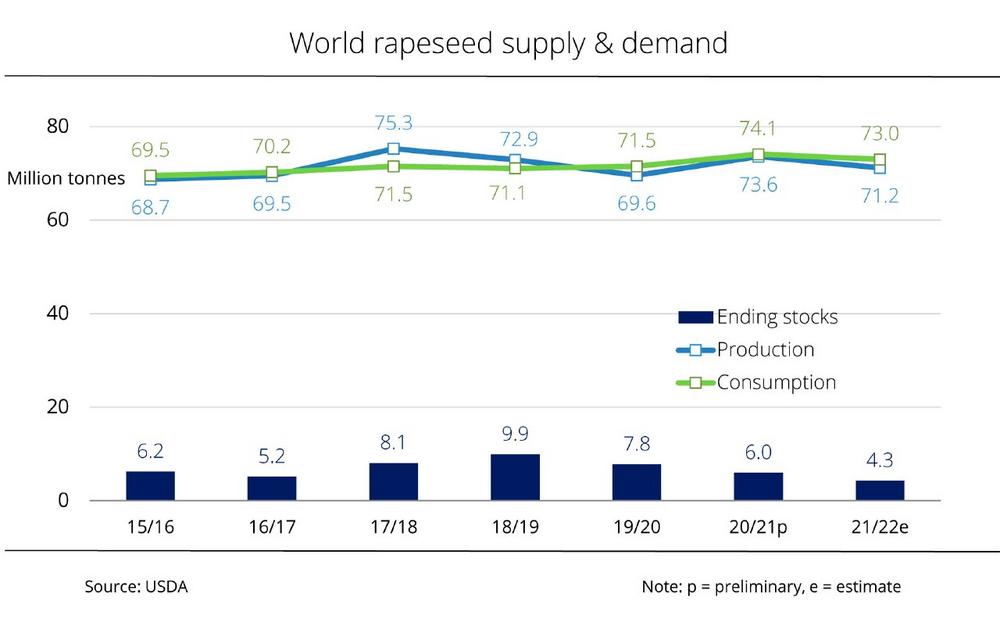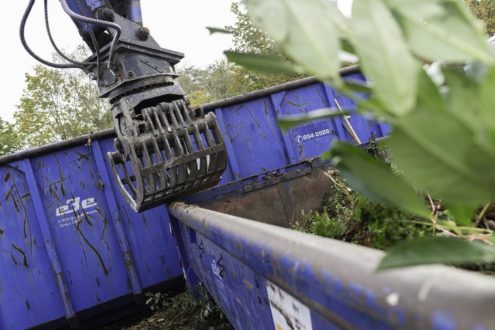
Global rapeseed supply/demand balance with marginal adjustments
The USDA also revised 2021/22 global rapeseed consumption upward in its latest monthly report. At 72.99 million tonnes, consumption is seen to be 449,000 tonnes larger than forecast in March. In other words, consumption in the running crop year will presumably fall 1.14 million tonnes short of the previous year’s level. The EU-27 is seen to consume 16.35 million tonnes, around 100,000 tonnes more than previously expected. The USDA anticipates even China’s demand to rise.
In view of the increase in consumption, 2021/22 ending stocks are likely to decline. According to the USDA’s April forecast, they will amount to 4.32 million tonnes. This is 130,000 tonnes lower than the previous month’s forecast and clearly down on the previous year’s figure of 5.97 million tonnes. Ending stocks in China in particular are seen to shrink significantly due to increased consumption. An expected rise in ending stocks in the United Arabian Emirates can only partially offset the decline.
By contrast, 2021/22 world trade in rapeseed is seen at 13.75 million tonnes, up around 19,000 tonnes from the previous month’s forecast. Nevertheless, this would translate to a 4.24 million tonne decline over the previous crop year. As a consequence, the UK, Kazakhstan and Paraguay will likely supply somewhat more than previously expected. The USDA sees a significant drop in import demand in the European Union. The USDA forecast of Ukraine’s 2021/22 exports is unchanged from the previous month at 2.7 million tonnes, which would be up 304,000 tonnes on the previous year’s volume. Considering the bombed ports and suspension of shipments by sea, actual figures will likely be considerably lower than forecast. The figures quoted above should therefore be viewed with some reservation.
The Union for the Promotion of Oil and Protein Plants e. V. (UFOP) represents the political interests of companies, associations and institutions involved in the production, processing and marketing of domestic oil and protein plants in national and international bodies. UFOP supports research to optimise agricultural production and for the development of new recycling opportunities in the food, non-food and feed sectors. UFOP public relations aim to promote the marketing of domestic oil and protein plant end products.
UFOP – Union zur Förderung von Oel- und Proteinpflanzen e.V.
Claire-Waldoff-Str. 7
10117 Berlin
Telefon: +49 (30) 2359799-40
Telefax: +49 (30) 2359799-99
http://www.ufop.de
Union zur Förderung von Oel- und Proteinpflanzen e
Telefon: +49 (30) 2359799-40
Fax: +49 (30) 2359799-99
E-Mail: m.leonhard@ufop.de
Telefon: +49 (30) 31904-225
E-Mail: s.arens@ufop.de
![]()



